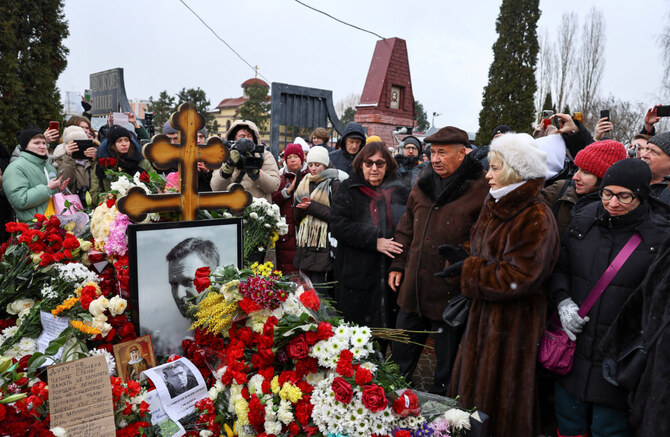MOSCOW: At least 1,500 Russians came to the grave of Alexei Navalny in Moscow on Sunday, risking reprisals and braving freezing temperatures to pay their respects to the opposition leader on the first anniversary of his death in prison.
Navalny — Russian President Vladimir Putin’s main opponent declared “extremist” by Moscow — died on February 16, 2024 in Penal Colony Number Three in Kharp, above the Arctic Circle.
AFP saw hundreds come to Navalny’s grave at Borisovsky Cemetery, leaving flowers and forming a large queue by mid-afternoon.
Russia has still not fully explained the circumstances of his death — saying he died during a walk in the prison yard.
His mother Lyudmila Navalnaya told AFP that she was “doing everything” to push for an investigation and hoped those responsible would be punished.
“The whole world knows who ordered it,” she said, wearing dark sunglasses and holding back tears. “But we want them to know the perpetrators and the enablers.”
Navalny’s widow Yulia Navalnaya — living in exile and also declared an “extremist” — said her husband “continues to unite people” after his death.
Having taken up her dead husband’s mantle from abroad, Navalnaya called on exiled Russians to take to the streets in place of those unable to back home.
The EU said Putin bore “ultimate responsibility” for Navalny’s death and German Chancellor Olaf Scholz said: “His courage made a difference and reaches far beyond his death.”
Remembrance events were taking place with Russia’s exiled opposition movement still plagued by infighting and badly weakened since the loss of its figurehead.
Anybody in Russia who mentions him or his Anti-Corruption Foundation without stating that they have been declared “extremist” is subject to fines, or up to four years in prison for repeated offenses.
Moscow has led a huge crackdown on dissent during its Ukraine offensive, launched nearly three years ago, which Navalny had denounced from prison.
An Orthodox priest read out a prayer by his grave, covered in flowers, with many crying.
Pensioner Ivan said that coming to the grave was like a “little personal protest” for him.
The 63-year-old said he was initially cautious about Navalny’s politics, but after the opposition figure’s poisoning in 2020 and subsequent jailing his attitude “became very personal.”
Anna, a 30-year-old veterinarian, came to the grave with her two children saying people should “never forget” him.
She said she wanted to show her children “the grave of a man who was very dear and important to us.”
In Berlin, Navalny’s widow thanked supporters braving the risk of reprisals to pay respect to her husband back in Russia.
“We must come out (to protest) for those people in Russia who can’t,” Navalnaya said in a church in the German capital — where many Russian exiles have settled.
In Russia people “are afraid to come out,” she said, “because they are afraid of ending up in jail.”
“Here of course we can feel free but people in Russia are hostages of the regime.”
She urged her supporters to take part in an opposition march in Berlin on March 1 with the slogan “Russia against Putin,” which will come days after the third anniversary of Russia’s military offensive in Ukraine.
Around 40 people also gathered outside the Russian embassy in the city, laying flowers in the snow.
Yuri Korolyov, a 32-year-old Russian now living in Germany, recalled handing out leaflets in support of Navalny’s failed attempt to run for president in 2018.
“He’s a person who died for his idea,” Korolyov said, adding that Navalny had changed his life.
Russian pro-Kremlin Telegram channels warned supporters against going to the cemetery in Moscow.
“We give brief advice to those who plan to go there but are not yet sure — don’t go!” said a post shared by pro-Kremlin journalist Dmitry Smirnov and on other channels.
The message warns of “Big Brother and his ever-watchful eye” with a photo of a security camera sign at the cemetery gates.
Russia has not fully explained Navalny’s death, which came weeks before a presidential election that extended Putin’s more than two-decade rule.
Moscow has branded Navalny’s Anti-Corruption Foundation and the regional offices he set up as “extremist organizations.”
Participation in an extremist group is punishable by up to six years in prison and many who campaigned in support of Navalny have been jailed or fled the country.
Four independent journalists are currently on trial for “participating in an extremist group,” accused of preparing photos and video materials for Navalny’s social media channels.
Russia jailed three lawyers last month who defended Navalny, on an extremism charge for passing on his messages from prison, prompting international condemnation.
Navalny was arrested in 2021 after returning to Russia following medical treatment in Germany for poisoning with the Novichok nerve agent.
















